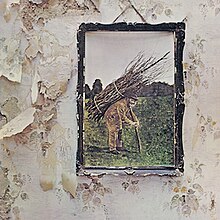
Back Led Zeppelin IV Azerbaijani Led Zeppelin IV Bulgarian Led Zeppelin IV Catalan Led Zeppelin IV Czech Led Zeppelin IV Danish Led Zeppelin IV German Led Zeppelin IV Greek Led Zeppelin IV Spanish Led Zeppelin IV Estonian لد زپلین ۴ Persian
| Untitled | ||||
|---|---|---|---|---|
 | ||||
| Studio album by | ||||
| Released | 8 November 1971 | |||
| Recorded | December 1970 – February 1971[1][2] | |||
| Studio |
| |||
| Genre | ||||
| Length | 42:37 | |||
| Label | Atlantic | |||
| Producer | Jimmy Page | |||
| Led Zeppelin chronology | ||||
| ||||
| Singles from untitled | ||||
| ||||
The untitled fourth studio album by the English rock band Led Zeppelin, commonly known as Led Zeppelin IV,[a] was released on 8 November 1971 by Atlantic Records. Produced by the band's guitarist, Jimmy Page, it was recorded between December 1970 and February 1971, mostly in the country house Headley Grange. The album contains the band's most well-known recording, the eight-minute-long "Stairway to Heaven".
The informal recording environment inspired the band, allowing them to try different arrangements of material and create songs in various styles. After the band's previous album Led Zeppelin III (1970) received lukewarm reviews from critics, they decided their fourth album would officially be untitled and represented instead by four symbols – one chosen by each band member – without featuring the name or any other details on the cover. Unlike the prior two albums, the band was joined by guest musicians: the singer Sandy Denny on "The Battle of Evermore", and the pianist Ian Stewart on "Rock and Roll". As with prior albums, most of the material was written by the band, though there was one cover song, a hard rock re-interpretation of the Memphis Minnie blues song "When the Levee Breaks".
The album was a critical and commercial success and is Led Zeppelin's best-selling album, having shipped over 37 million copies worldwide. It is one of the best-selling albums in the United States and of all time, while critics have regularly placed it high on lists of the greatest albums of all time.
- ^ a b Cite error: The named reference
lz4was invoked but never defined (see the help page). - ^ Lewis 1990, pp. 51, 89.
- ^ Daryl Easlea (2007). "Led Zeppelin IV Review". www.bbc.co.uk. BBC. Retrieved 12 February 2023.
Recorded at Headley Grange in Hampshire, Island Studios in London and Sunset Sound in Los Angeles
- ^ Matthew Wilkening (16 November 2020). "10 Things You Didn't Know About Led Zeppelin 'IV'". ultimateclassicrock.com. Retrieved 12 February 2023.
big parts of the record were recorded at places like Island Studios and Sunset Sound.
- ^ Lewis 1990, p. 51.
Cite error: There are <ref group=lower-alpha> tags or {{efn}} templates on this page, but the references will not show without a {{reflist|group=lower-alpha}} template or {{notelist}} template (see the help page).